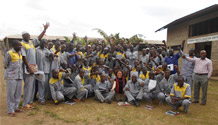
Dr Inmaculada Adarves-Yorno is helping to rehabilitate prisoners in Kenya by teaching them to practice mindfulness.
Exeter expert starts a “mindfulness revolution” in Kenyan prison
A University of Exeter academic is helping to rehabilitate prisoners in high security Kenyan jails by teaching them to practice mindfulness.
The work of Dr Inmaculada Adarves-Yorno is helping the prisoners handle their emotions while in this difficult environment. She is working with the Kenyan Prison Services and an organisation which develops leaders and makes prisons places of positive transformation, the African Prisons Project (APP) to create a unique rehabilitation programme.
Inmates, some of whom have been given death sentences, are using a series of self-awareness and mindfulness techniques to help them become more emotionally resilient.
Prisoners have told Dr Adarves-Yorno, who they call Dr Inma, the training has changed their life, and they will help mentor and educate others. One told her: “I now have hope. I have learnt how to let anger and frustration go”. Another said: “I have changed the way I was thinking and reacting to my enemies. I have changed by not giving the emotions more energy”.
Mindfulness involves learning to be aware of what is happening within you and around you. During this training inmates are taught specific techniques to manage their mind and their emotions.
Dr Adarves-Yorno was invited by Alexander McLean, the founder the African Prisons Project, to help deliver training to senior managers of Kenyan prisons in England two years ago. She has now trained more than 360 people at all levels of the Kenyan Prison Services and worked particularly in the maximum security prison Naivasha.
Mr McLean said: “This training is having an amazing impact on individuals and institutions and there is a great potential for replication.
“Dr. Adarves-Yorno’s teaching lit a match that started the fire we now see burning in Naivasha and we are sure it will quickly propagate with the same force in other Kenyan Prisons too.”
In Naivasha, the largest maximum prison in Kenya, a group of 80 inmates have been trained as “Mindful Leaders”. They are currently training other inmates in mindfulness. They have developed a wide range of initiatives such as an anti-crime plan and a “forgiveness manifesto”. All these will help prisoners settle back into their community on their return from jail.
Analysis of the programme at Naivasha indicates the prisoners trained in mindfulness are more equipped to take their place back in society, are more resilient, have better mental wellbeing and value helpfulness, honesty and responsibility. The work is due to expand in the same way in three other prisons, Langata, Kamiti and Kisumu.
The work is supported by the Director of Rehabilitation in the Kenyan Prisons Services, Madam Mary Khaemba, who said: "The work that Dr. Adarves-Yorno is doing in Naivasha has immense potential as it can generate the knowledge and resources for new rehabilitation programmes.”
Dr Adarves-Yorno said: “It is extraordinary to work with this group of men. My work has become “our” work and I am in awe of their transformation and the transformation that they are leading in others.
“One of the key aims of each session was to enhance self-awareness and self-discovery. During the training, we told each participant that this was the first day of the rest of their life and helped them let go of unnecessary baggage.”
“It was a very interesting environment to work in. It was full of unknowns and surprises. Some prisoners are studying law, others have been given death sentences and were angry and fearful. But the prisoners I am working with have something in common: they want to make this world a better place.”
Patrick Mwenda, the Officer in Charge in Naivasha, said: “The impact that the training is having in Naivasha is a force to reckon with. It has led to positive changes for the trained inmates and this is spreading to the entire prison population.”
This project is funded by the Economic and Social Research Council, the University of Exeter Business School and the African Prisons Project.
A video of the project can be viewed online.
Date: 18 October 2016
